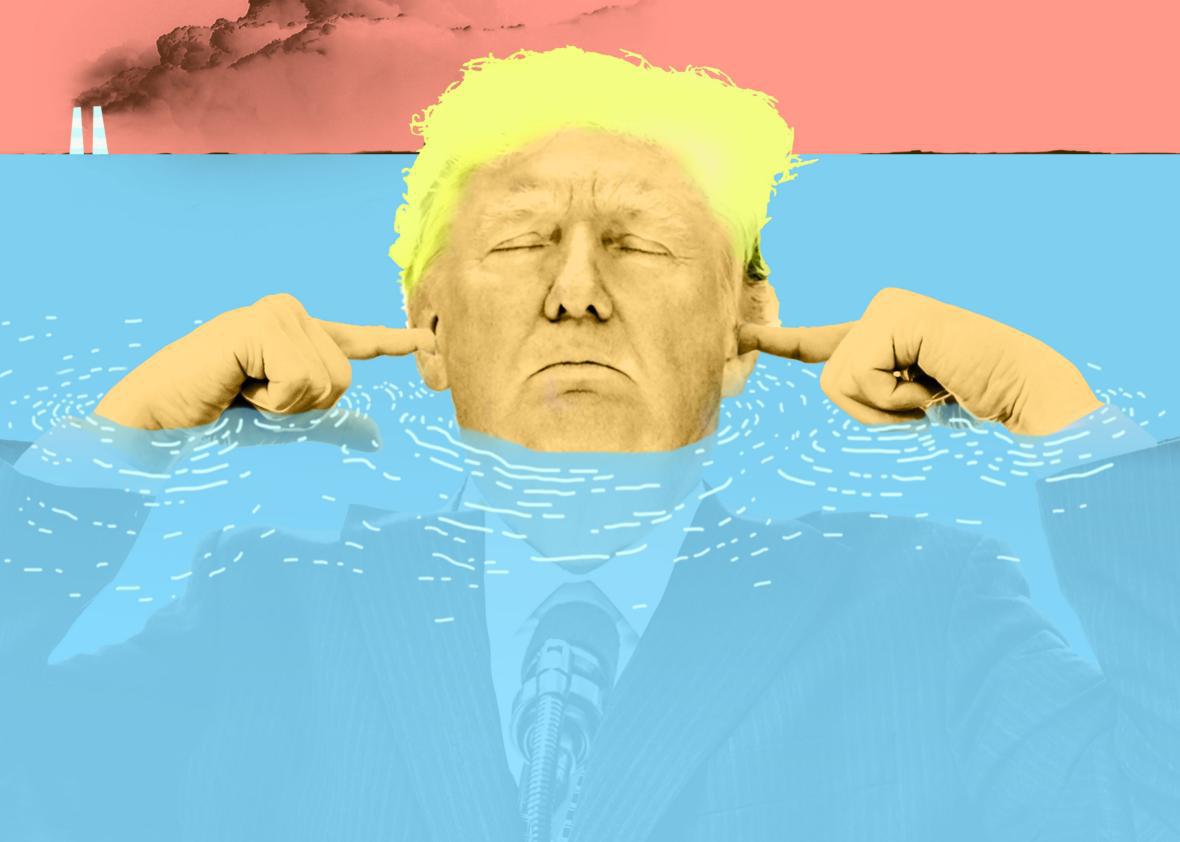In 2010, I began work on a novel set in a time I was certain would be looked upon as one of the most embarrassing periods of the climate change “debate”: the George W. Bush era. The novel, set at South Pole Station and the West Antarctic Ice Sheet, takes as its premise the residency of a denialist scientist at the world’s foremost climate research site. It is, in part, a dark comedy, and it was a fun story to write—mostly because Obama was in office and the absurdities of politicians trying to legislate climate change out of existence had begun to fade away.
But as the opening scenes of the Trump era began to play out, these gremlins are springing back to life. Witnessing this, particularly this week as Trump pulled us out of the Paris Agreement, I’ve run a gamut of emotions as I face a new reality. It’s a reality I once considered so remote that I created an imaginary version of it, a reality where we could all look back and laugh at when Big Oil and their faithful legislative servants had denied science, prevented government action, and created obstacles for researchers trying to come up with a solution. Making climate change denialism a part of my novel allowed me to write about an existential threat with the safety of distance and humor. The safety comes from the understanding that we’re going to put this behind us and escape—perhaps by the skin of our teeth, but it’s an escape just the same.
But with the cartoonish villainy of deniers like Lamar Smith and Scott Pruitt ascendant, that safety is gone. It feels a little like reading Catch-22 and then glancing up from the pages to see the sky filled with B-25s. It’s not funny anymore because it’s not in the past. It’s here. Anyone who watched the president speak on Thursday knows it.
Like so many others who care deeply about climate change, I spent most days awash in frustration, grief, and fear. But it’s the rage that’s sticks, and with it has come a premature but unshakable desire for accountability. I can no longer skewer climate deniers and bought legislators in my fiction—that has too much of a documentary feel to it these days. Instead, I find myself daydreaming about an America beset by the realities of climate change.
It’s a harsh world, but a just one. Here, government officials answer for their denialism and obstruction of climate change research and adaptation strategies that might have aided us in mitigating the pain of the impact. The Ebell–Inhofe hearings—named for two of the most notorious “climate criminals,” Myron Ebell and James Inhofe—are held following the final municipal submersion of Charleston, one year after the evacuations of Red Hook and lower Manhattan. These hearings are run by newly elected legislators, swept into office on the Vote Climate movement. The most prominent denialists of the last 50 years are brought before a bank of cameras and asked to atone for the harm they have wrought.
The increasing frequency of massive hurricanes on the East Coast, combined with the devastating droughts in the West, has resulted in widespread destruction both in cities and in rural communities. Applications for federal aid far exceed the government’s ability to pay. Luckily for taxpayers, but perhaps less so for climate deniers, the Office of Climate Resilience and Mitigation has combed through the Library of Congress’ Twitter archive to identify 2 million users who regularly refuted climate change. These rolls are cross-checked with FEMA applications: Those appearing on both lists are not denied aid, but their checks are docked an “obstruction fine,” which helps finance federal disaster relief.
One of the only individuals in the Trump administration who does not serve time for climate crimes is Secretary of Defense James Mattis, who is hailed by future generations as a hero for remaining steadfast in his assertions that climate change was the country’s No. 1 security threat. During the hearings, an angry, frightened country is outraged by Scott Pruitt’s insistence that he only questioned whether carbon dioxide was causing global warming, not whether global warming exists. Pruitt thinks he deserves mercy, but the country has a hard time with mercy these days. Office and Management Budget Director Mick Mulvaney has the dubious honor of seeing his words carved into the Climate Victim Memorial Wall in a soggy Washington, D.C.: “We’re not spending money on that anymore. We consider that to be a waste of your money.”
Is what I’m imagining too harsh? I don’t know. It’s certainly a different feeling than the one I experienced as I wrote about the climate deniers of the early 2000s: the smug comfort of a person who thinks we’ve actually learned something. But I’ve been in communities affected by both manmade and natural disasters, and the desire to hoist the responsible players on their own petard is intense and long-lived. I confess that these daydreams have become a comfort to me because they suggest that in the midst of the pain unleashed by the impact of climate change there will be a final reckoning.
Maybe this need for imagined penance means I’m vengeful. When I’m in a more self-forgiving mood, I like to believe it simply means I’m human. But as time passes, I worry that this vision, as bleak as it may be, might be the happiest ending we can hope for.
